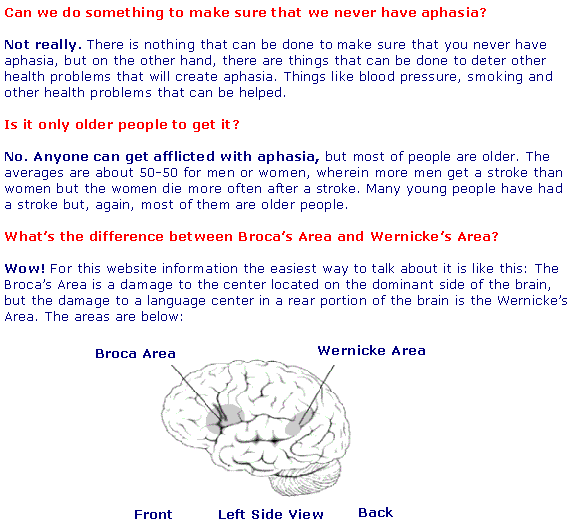|
In this website we talk about Wernicke's Aphasia most of the time. This is the center in a rear portion of the brain that may be helped with therapy.
For those afflicted with aphasia, how can they say their intelligence is intact but can't talk? I don't understand.
The brain has not changed the intelligence at all, but the blood flow to the brain is temporarily interrupted. If those cells are damaged at the portions that use the language areas, so that means that the brain is "intact" but the communication systems are not. Those afflicted may be able to understand anything, or everything, but cannot speak properly.
What research is being done for aphasia?
There are two different parts of research: the research for therapies and the evaluation of the brain itself. Aphasia research in the brain includes understanding of the function of the brain, using brain imaging techniques to define brain function, determine the severity of damage and try to predict the severity. Procedures include PET (positron emission tomography), CT (computed tomography) and MRI (magnetic resonance imaging).
The research to help others that have been afflicted include effective treatment strategies and seem to be studied new drugs shortly after a stroke. A few books have talked about computers to help to relearn, but I have not seen any serious computer therapies.
You told me that most of the people do not "get better" much, but you also told me that you did. What's the difference?
That's what I do! That's what I did...the difference is everything in my website. Clearly, the difference between me and the others is my strategy, my plan and my computers and programs. I believe many others can do the same thing, but they will not try. Most of them will believe the same thing that many therapists: this is simply the way it is.
What do you need to help others to do the same thing?
Visibility. What I have done can be done for others also, but I think we need some visibility. Today's technology can help thousands of people to relearn using the computers and programs. I do not believe the state-of-the-art for afflicted have been talked about or used for therapy. Most of them do not even know that it can be done. I need visibility. I must have a way to tell people that it can be done, and then help them to do it.
|
|



